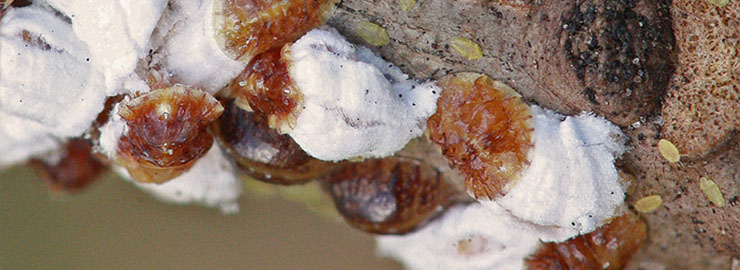The most important armored scale pests in Florida are snow scale (Unaspis citri), Florida red scale (Chrysomphalus aonidium), purple scale (Cornuaspis beckii), Glover’s scale (Lepidosaphes gloveri), and chaff scale (Parlatoria pergandii). Important soft scale insects include Caribbean black scale (Saisseta neglecta), brown soft scale (Coccus hesperidium), and Florida wax scale (Ceroplastes floridensis). Pest management of both armored and soft scale insects in Florida citrus is based on highly successful action of native and introduced exotic natural enemies, including predators, parasites, and pathogens.
These relatively specific natural enemies co-exist with their hosts in the citrus grove under most conditions and can respond to suppress pest numbers when they periodically increase in individual groves. Thus, scale insects should not be considered key pests in development of seasonal pesticidal programs. However, there are conditions under which natural enemies may not function well. It is in these cases that scale insects achieve importance in our overall IPM program. Factors that are most often responsible for increases in scale populations are: a) weather conditions that disrupt biological control; b) movement of the pest to groves where natural enemies do not occur; and c) disruption of natural enemies by other practices, particularly the repeated use of non-selective insecticides during a period when natural enemies are active and exposed.
When these disruptions occur, scale populations can increase to the point where leaf, fruit, twig, branch and/or trunk populations cause damage. The sessile nature of scale insects promotes high concentrations of scales in limited areas within the grove, thus building populations can go unnoticed for several generations. Generation times for most scale species require more than one month to progress from egg to adult. Thus, populations do not build quickly like some other pest groups such as mites or aphids.

